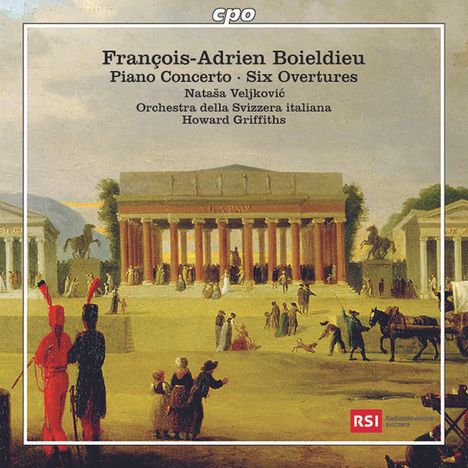Francois-Adrien Boieldieu: Klavierkonzert D-Dur auf CD
Klavierkonzert D-Dur
Herkömmliche CD, die mit allen CD-Playern und Computerlaufwerken, aber auch mit den meisten SACD- oder Multiplayern abspielbar ist.
+Ouvertüren zu Le Calife de Bagdad, Emma ou La Prisonniere, La Dame blanche, Jean de Paris, Les Voitures versees, Ma tante aurore
- Künstler:
- Natasa Veljkovic, Orchestra della Svizzera Italiana, Howard Griffiths
- Label:
- CPO
- Aufnahmejahr ca.:
- 2015
- Artikelnummer:
- 8455667
- UPC/EAN:
- 0761203524426
- Erscheinungstermin:
- 12.11.2018
Overtüren & Klavierkonzert vom „französischen Mozart“
François-Adrien Boieldieu zählt zu den wichtigsten Vertretern der „Opéra comique“ zur Zeit des Empire und der sich anschließenden Restaurationsepoche. Mit La Dame blanche (1825) ist ihm sogar eines der weltweit erfolgreichsten Stücke der Gattung überhaupt geglückt, das anderen Komponisten geradezu als Musterbeispiel diente und in der weiteren Entwicklung der „Opéra comique“ eine bedeutende Rolle spielte. Francois Boieldieu erhielt seine frühe musikalische Erziehung besonders durch Charles Broche, den Organisten der Kathedrale von Rouen, 1796 ging er nach Paris, wo er Cherubini kennenlernte. Von 1803 bis 1811 war er Hofkomponist in Sankt Petersburg, 1817 wurde er Professor für Komposition am Conservatoire de Paris. In den Ouvertüren seiner „Opéras comiques“ nimmt Boieldieu meist thematisches Material der jeweiligen Oper vorweg. Die Ouvertüre bereitet den Zuhörer so nicht nur auf die Stimmung und das Klangkolorit der entsprechenden „Opéra comique“ vor, sondern sorgt darüber hinaus auch für einen Wiedererkennungseffekt, wenn die bereits aus der Ouvertüre bekannten Themen an späterer Stelle der Bühnenhandlung wieder auftauchen. Für Boieldieus Musik, so auch für das hier zu hörende Klavierkonzert (UA: 1792 in Rouen), sind insbesondere der große melodische Erfindungsreichtum sowie die ausgeprägte Kantabilität seiner Melodik charakteristisch, die dazu führten, dass seine Zeitgenossen ihn den „französischen Mozart“ nannten.
Product Information
The »French Mozart’s« Overtures and Piano Concerto
François-Adrien Boieldieu numbers among the most important exponents of the opéra comique of the French imperial era and the subsequent restoration. With La dame blanche (1825) he even produced one of the internationally most successful works of this genre; it served as a model example for other composers and played a significant role in the further development of the opéra comique. François Boieldieu received his early training in music in particular from Charles Broches, the organist at the Rouen Cathedral. In 1796 he went to Paris, where he met Cherubini. From 1803 to 1811 he was the court music director in St. Petersburg, and in 1817 he became a professor of composition at the Paris Conservatory. In the overtures of his opéras comiques Boieldieu usually anticipates thematic material from the particular opera. As a result, the overture not only prepares the listener for the atmosphere and tone color of the particular opéra comique but also provides for a recognition effect when the themes familiar from the overture reappear in a later phase of the stage action. The great wealth of melodic invention and the pronounced melodic cantability particularly characteristic of Boieldieu’s music and the Piano Concerto heard here (premiere: 1792 in Rouen) inspired his contemporaries to call him »the French Mozart.«
Rezensionen
pizzicato.lu 01/2019: »Die Begeisterungsfähigkeit Griffiths' für Boieldieus Musik ist auch in jedem Takt spürbar. Sechs Ouvertüren und ein wunderschönes Klavierkonzert hat er ausgegraben und präsentiert uns diese Werke in sehr dynamischen und spielfreudigen Interpretationen. Seine spritzige Musik und seine schönen Melodien bezaubern auch noch heute, wie wir in den vom ›Orchestra della Svizzera Italiana‹ flott gespielten Ouvertüren feststellen können. Die große Überraschung dieser CD ist aber das sehr schöne, zweisätzige Klavierkonzert - ein Jugendwerk -, das jeder kennen sollte, der Klavierkonzerte liebt.«Disk 1 von 1 (CD)
Le calife de Bagdad (Der Kalif von Bagdad, Oper in 1 Akt) (Auszug)
-
1 Ouvertüre
Emma ou La Prisonnière (Oper) (Auszug)
-
2 Ouvertüre
La Dame blanche (Die weiße Dame, Oper in 3 Akten) (Auszug)
-
3 Ouvertüre
Jean de Paris (Johann von Paris, Oper in 2 Akten) (Auszug)
-
4 Ouvertüre
Les Voitures versées (Oper in 2 Akten) (Auszug)
-
5 Ouvertüre
Ma Tante Aurore (Oper in 2 Akten) (Auszug)
-
6 Ouvertüre
Konzert für Klavier und Orchester F-Dur
-
7 1. Allegro
-
8 2. Pastorale con variazioni
Mehr von Francois-Adrien...
-
Francois-Adrien BoieldieuLa Dame Blanche (in dt.Spr.)2 CDsAktueller Preis: EUR 10,99
-
Französische Klavierkonzerte2 CDsVorheriger Preis EUR 12,99, reduziert um 0%Aktueller Preis: EUR 4,99
-
Osian Ellis - French Music for Harp & EnsembleCDAktueller Preis: EUR 9,99
-
Marisa Robles spielt HarfenkonzerteCDVorheriger Preis EUR 9,99, reduziert um 0%Aktueller Preis: EUR 7,99










